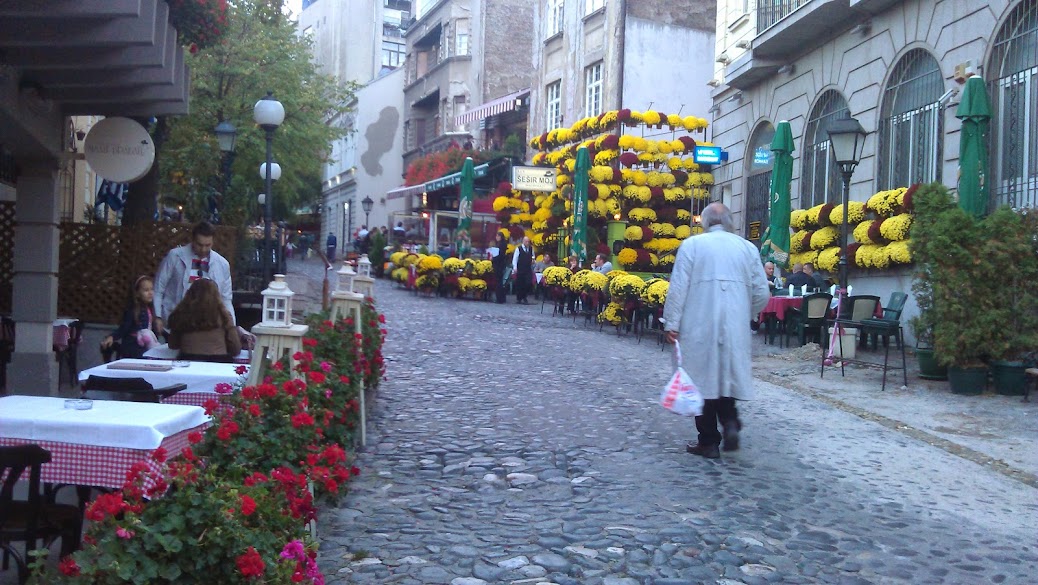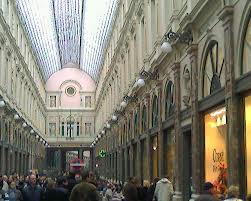 Hi everyone, sorry for the lateness of this post. I was traveling back from Berlin. It is good to be back in Seattle, though I am jetlagged and look kind of like someone just punched me in both eyes. Today I realized I have lost 5 pounds, which gives me a great idea: The Vegan Balkans Diet! Basically, just become a vegan, then go to the Balkans.
Hi everyone, sorry for the lateness of this post. I was traveling back from Berlin. It is good to be back in Seattle, though I am jetlagged and look kind of like someone just punched me in both eyes. Today I realized I have lost 5 pounds, which gives me a great idea: The Vegan Balkans Diet! Basically, just become a vegan, then go to the Balkans.
Since I’m jetlagged and trying not to fall asleep until at least 9pm, I don’t know how coherent this post is going to be. Berlin, Germany was really great, except that people were kind of rude, saying things like “You do not have an account at this bank? Then no, you may not withdrawal money here” and “Stop! You can’t just try to break off a piece of the Berlin Wall at this museum!”
We arrived just as news broke about the NSA listening to Angela Merkel’s cell phone. Reactions to us Americans were mixed, leaning negative. “I was a fan of Obama,” said one taxi driver, “but not anymore.”
Overall, this Fellowship has been amazing and exhausting. There is a lot of information to process for months to come. Before I leave writing about Europe, and get back to talking about unicorns and wombats next week, I want to capture a few last thoughts and observations:
- Politicians in Copenhagen are efficient, collegial, and seem to get along even when they disagree on policies. That’s right, politicians can disagree on policies and still grab a beer together! This is so not true in the US for the most part, where a simple disagreement on something can lead to fist-fights at the farmer’s market and a burning hatred for two decades.
- That being said, the smorrbrod, or open-faced sandwich, is one of the most inefficient ways of eating anything. One piece of very dry rye bread, pile all the toppings on, and then try to eat it with a knife and fork. Plus, it is expensive as hell living in Copenhagen. I saw a Twix that was 7 dollars. No wonder the nonprofit structure is underdeveloped there. Nonprofit staff would not be able to afford the time or money to live in Denmark. We don’t have three hours to eat a $26 smorrbrod.
- Religion is important in Europe, but it is considered a private matter and it is highly distasteful for politicians to use it as a tool for election. They find it bizarre when our presidential candidates talk about their religious beliefs, and even worse, when inaugurations and other formal occasions include prayers and blessings. “Religion here is like a penis,” said one of the politicians that I met, “it’s OK for you to have one. But don’t wave it around people’s faces.”
- Gender dynamics varies from country to country. In Denmark, men and women are pretty much equal, with the top three highest posts in Copenhagen politics all held by women. In other places, it is different. In Lisbon, Portugal, for example, the waiters served all the women first. I found this the hard way when the waiter skipped over me when serving dinner rolls, which was very annoying, since I am vegan, and dinner rolls with some olive oil were all I could eat!
- Immigrants all have a hard time in the various countries we visited, except maybe Portugal. Discrimination has been more subtle (“So, do you drink?” to find out if you’re Muslim during a job interview).
- The Roma community seems to be having the most challenges in almost all countries, and it is heartbreaking the few times I saw women and small children sleeping on the grass or cement. Some countries have strong welfare systems, but if you don’t have the right papers, you’re pretty much screwed, and also because of the strong welfare system the general public is often complacent to help.
- Immigrant girls seem to be doing best in school, sometimes even out-performing the local kids. They are leaving the boys behind, which often creates resentment, and then they don’t want to marry the underperforming men from their culture, creating other problematic dynamics within the community.
- The Balkans’ traditional alcohol, called Rakia, aka “Balkan moonshine,” is not for the weak of stomach. It is made by fermenting fruit and, I believe, turpentine. It is a great digestive, and, when necessary, lamp fuel.
- According to most “normal” people we met, the EU is incredibly boring, just 700+ Eurocrats who hand down obscure legislations to the rest of Europe. National media are loath to cover EU stuff because it is so boring. When I left, they were considering my suggestion of fabricating a good scandal to increase public interest.
- Belgian chocolates are pretty good, but quality varies. Some of it is way too sweet. I daresay that our artisanal chocolates in Seattle can compete on the same level with some of these European chocolate makers.
- Europeans are continually amazed and inspired by how open Americans are. We’ll invite just about anyone to our Thanksgiving dinner. In Europe it is harder, and you might have to know someone for twenty years and maybe marry them before they’ll show you where they live.
- The Danish concept of “hyggeligt” (pronounced something like “hoogly”) is very prevalent. It means something like “cozy, with a sense of intimacy and contentment” like “this dinner party is so hyggeligt.” It’s great, though they didn’t understand my “yo mama so hyggeligt” jokes, e.g. “Yo mama place so hyggeligt, it smells like fresh-baked blueberry muffins.”
- Serbians have a great and biting sense of humor. On a plane there I read an article that ends with something like, “I hope you, dear reader, will tell people about this interview that you just read. Mainly for your sake, since it means that your plane hasn’t crashed.”
And I’m very happy that the plane didn’t crash. I’m glad to be back. I missed my family. I even missed my staff and only yelled at them a little bit for forgetting to water the office plants. I am ready to get back to life and to my projects here, including working on 501c3 The Musical, which will now be kicked into full gear, once I catch up on The Walking Dead.
 Hi everyone. I am so exhausted. I don’t think I have thought this intensely for this long a period of time since, I don’t know, maybe the first season of Game of Thrones. I am now in Serbia in the city of Belgrade, some place that I never thought I would be. No one really says, “I want to go to Serbia for vacation” or “We’re going to Serbia for our honeymoon” or “Congratulations, you just won a free trip to Serbia!”
Hi everyone. I am so exhausted. I don’t think I have thought this intensely for this long a period of time since, I don’t know, maybe the first season of Game of Thrones. I am now in Serbia in the city of Belgrade, some place that I never thought I would be. No one really says, “I want to go to Serbia for vacation” or “We’re going to Serbia for our honeymoon” or “Congratulations, you just won a free trip to Serbia!” hree teenage girls were taking selfies on their phone. People were drinking and laughing in the numerous restaurants all around, munching on their grilled meat. A homeless man, carrying bags of cans, went around checking the trash bins while cars drove slowly, navigating the cobblestone streets circling the park. Above and surrounding us, buildings rose upward, some new, some old, many probably having seen the destruction of Belgrade during the countless wars. I ate my vegan sandwich and took a moment to be grateful for this trip, for having the chance to experience Belgrade during peace time. You know, more people should think about Serbia for their honeymoon.
hree teenage girls were taking selfies on their phone. People were drinking and laughing in the numerous restaurants all around, munching on their grilled meat. A homeless man, carrying bags of cans, went around checking the trash bins while cars drove slowly, navigating the cobblestone streets circling the park. Above and surrounding us, buildings rose upward, some new, some old, many probably having seen the destruction of Belgrade during the countless wars. I ate my vegan sandwich and took a moment to be grateful for this trip, for having the chance to experience Belgrade during peace time. You know, more people should think about Serbia for their honeymoon.

